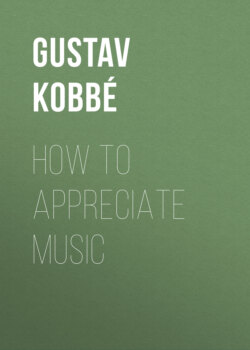Читать книгу How to Appreciate Music - Gustav Kobbé - Страница 21
На сайте Литреса книга снята с продажи.
The Fugue and the Virtuoso.
ОглавлениеIn his book, “Beethoven and His Forerunners,” Daniel Gregory Mason devotes a paragraph toward dispelling the mystery regarding the fugue that prevails with the public, and points out that “the actual formal rules, despite the awe they have immemorially aroused in the popular mind, are few and simple. After the first announcement of the subject by a single voice, it is answered by a second voice, at an interval of a fifth above; then again stated by a third voice, and answered by a fourth. This process goes on until each voice has 57 had a chance to enunciate the motif, after which the conversation goes on more freely; the subject is announced in divers keys, by divers voices; episodes, in a congruous style, vary the monotony; at last the subject is emphatically asserted by the various voices in quick succession (stretto), and with some little display or grandiloquence the piece comes to an end.”
Further along in the same book Mr. Mason has a page of apostrophe to the Bach fugues. When he characterizes them as “the first great independent monuments of pure music,” and refers to their “consummate beauty of structure,” he pays them an eminently just tribute. But when he speaks of the “profundity, poignancy and variety of feeling they express,” I am inclined to quote his own qualifying sentence from the next page of his book: “It is true, nevertheless, not only that the fugue form makes the severest demands on the attention and intelligence of the listener, but also that, because of the ecclesiastical origin and polyphonic style, it is incapable of the kind of highly personal, secular expression that it was in the spirit of the seventeenth century to demand.” The same is even more true of the eighteenth, nineteenth and twentieth centuries. The progress of music toward individual freedom of expression on the part of the composer, and equally so on the part of the interpreter, has been steady, and when, through the very perfection which Bach imparted to counterpoint, it ceased to attract composers as a means of expression because he had accomplished so much there was nothing more left for them to do along the same lines, the progress I have indicated received a great lift and stimulus.
58
